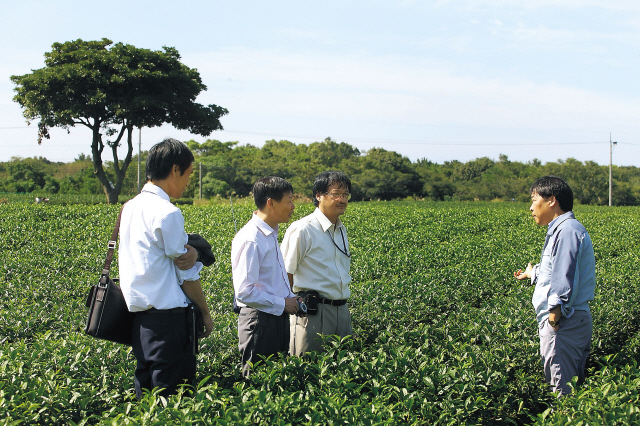Amore Pacific’s tea business has enjoyed double-digit growth since 2008, while the overall tea industry here has been waning, especially compared to that of China and Japan.
To pave the way through the expected market stagnation, the South Korean cosmetics company focused on organic cultivation and quality innovation, according to company officials.
As a result of intense research and effort, the whole of its 1.8 million square meter tea garden, where the company has grown green tea since it was cleared in the 1970s, was turned into an organic garden by 2009.
To pave the way through the expected market stagnation, the South Korean cosmetics company focused on organic cultivation and quality innovation, according to company officials.
As a result of intense research and effort, the whole of its 1.8 million square meter tea garden, where the company has grown green tea since it was cleared in the 1970s, was turned into an organic garden by 2009.

“Ingredients such as guano, which is the excrement of sea birds, rape plants, beans and leftovers of castor beans after making castor-oil were used to produce high-quality organic fertilizer,” explained a company official through statement.
To enhance the taste and scent of green tea, officials explained that ingredients including seaweed and sea grass that contain high levels of amino acids, such as green laver; and liquid squeezed from protein-rich fish like mackerel were added to the fertilizer after an year of fermentation.
The company also established a Sulloc Tea Research Center in 2003, the first of its kind created by a private company, and gathered experts from various sectors related to tea-making, including cultivation, pest-extermination, production and analysis.
Some of the new ways to get rid of insects and pests that the researchers came up with include cutting the tea tree branches deeply, and using the pheromones of a female moth.
As a result of the efforts, the company earned a certificate from the International Federation of Organic Agriculture Movements and the National Organic Program certification from the U.S. Department of Agriculture in 2010, and the EU-Organic certificate in 2011.
Currently, the research center runs programs to share technology and educate tea farms in Jeju Island.
“Simply seeking profit was not the aim of the company’s tea business to begin with,” said a company spokesperson.
“Amore Pacific rather began the business to preserve the nation’s excellent tea culture and promote it. The vision of the company’s tea sector, ‘Tea Culture Creator,’ reflects our goal,” he said.
By Park Min-young (claire@heraldcorp.com)
-
Articles by Korea Herald





![[K-pop’s dilemma] Can K-pop break free from ‘fandom’ model?](http://res.heraldm.com/phpwas/restmb_idxmake.php?idx=644&simg=/content/image/2024/05/09/20240509050541_0.jpg&u=20240509173751)




![[News Analysis] Yoon's first 2 years marked by intense confrontations, lack of leadership](http://res.heraldm.com/phpwas/restmb_idxmake.php?idx=644&simg=/content/image/2024/05/09/20240509050612_0.jpg&u=20240509233252)








![[Today’s K-pop] NCT’s Mark to drop 1st solo album in February 2025](http://res.heraldm.com/phpwas/restmb_idxmake.php?idx=642&simg=/content/image/2024/05/10/20240510050597_0.jpg&u=)